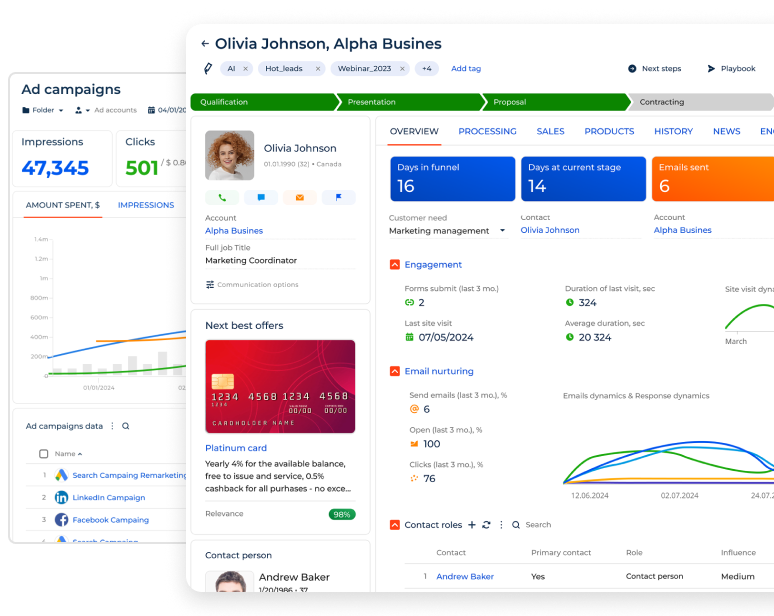-
No-Code
Platform
-
Studio
No-code agentic platform delivering the fastest time-to-value and the highest ROI
-
Studio
-
AI-Native CRM
CRM
-
AI-Native CRM
New era CRM to manage customer & operational workflows
CRM Products -
AI-Native CRM
- Industries
- Customers
- Partners
- About
Top 12 Salesforce Alternatives and Competitors in 2026
Updated on
January 14, 2026
20 min read
Build Faster. Grow Smarter. Try Creatio

A robust and efficient Customer Relationship Management (CRM) system is essential for driving business growth and building long-lasting customer relationships. Today, nearly every industry relies on CRM: finance and banking organizations use it to manage client portfolios, real estate firms leverage it to track leads and properties, and insurance companies depend on it to streamline policyholder interactions.
With so many CRM platforms available, choosing the right one can be a real challenge, especially for companies considering a switch from Salesforce. In this article, we explore the top Salesforce alternatives for 2026, highlighting their core functionality, advantages, and how they compare to the industry giant in helping organizations achieve success.
Key Takeaways
- The common reasons why users consider alternatives to Salesforce include high pricing, steep learning curve and complexity, challenges in customization and integration, inconsistent customer support, and poor user experience due to its unintuitive interface.
- The best Salesforce alternatives in 2026 are: Creatio, Zoho, HubSpot, Freshworks, Microsoft Dynamics, Vtiger, Oracle, SAP, Pegasystems, Zendesk, Insightly, and Monday.com.
- According to Nucleus Research, Salesforce users who switched to Creatio CRM report 37% reduction in technology costs, a 70% reduction in implementation timelines, and a 17% reduction in manual data entry for sales teams.
What is Salesforce?
Salesforce is a cloud-based platform offering customer relationship management (CRM) software to help businesses manage sales, marketing, customer service, and e-commerce. It is widely known for the extensive set of products and features, which allow companies to build stronger customer relationships, improve efficiency, and drive business growth. The core features of Salesforce CRM include sales and marketing automation, customer service and support, artificial intelligence (AI) and analytics, and extensive customization capabilities to adapt to organizational needs.
5 Main Reasons to Consider Alternatives to Salesforce
It makes sense to explore alternatives to Salesforce for a variety of reasons. While Salesforce is a good CRM, many businesses still need to deal with challenges that impact cost, usability, and overall value. The most common reasons that push Salesforce users to consider replacement are:
1. Extremely High Pricing
Salesforce is known for its expensive licensing model, with costs that can quickly escalate as you add features, users, or integrations. For many businesses, this leads to a total cost of ownership that far exceeds initial expectations, making more affordable alternatives highly attractive.
2. Steep Learning Curve and Complexity
The platform’s depth of features often comes at the expense of usability. Teams without extensive technical training may struggle to navigate Salesforce, slowing down adoption and reducing productivity. Some Salesforce alternatives, like Creatio or HubSpot, provide more intuitive, user-friendly experiences that accelerate time to value.
3. Challenges in Customization and Integration
While this platform offers flexibility, customizing it to specific workflows or integrating with non-Salesforce systems is typically challenging, expensive and requires long project timelines. Salesforce competitors typically deliver simpler, no-code or low-code customization and smoother integrations.
4. Slow and Inconsistent Customer Support
Many users report that Salesforce support can be difficult to access, slow to respond, or inconsistent in quality. For organizations that rely on fast resolution of technical issues, this can create bottlenecks and frustration. Alternatives frequently emphasize stronger, more responsive support
5. Unintuitive Interface
Salesforce’s interface is often criticized for being cluttered and unintuitive, which can make even routine tasks cumbersome for end users, reducing overall adoption. Modern CRM systems tend to focus on cleaner, more streamlined interfaces designed to simplify navigation and enhance efficiency.
What Should You Look for in a Salesforce Alternative?
To ensure your new CRM delivers both technological maturity and tangible business value, focus on the following criteria:
- Key Features: A strong CRM should cover all the essentials, including sales and marketing automation, pipeline management, contact and account management, analytics and reporting, and robust customer service tools. Avoid fragmented platforms that offer unbundled or limited CRM features, as they often lead to higher costs and inefficiencies.
- AI Tools & Agents: While most CRMs provide basic AI tools for data analysis, predictions, and personalization, advanced Salesforce alternatives also offer role-specific AI agents that autonomously manage routine tasks and enhance workflows. For instance, Creatio’s Account Research Agent enriches profiles with insights, a Meeting Agent prepares agendas and talking points, and a Quote Generation Agent streamlines pricing and proposals to boost teams efficiency and enable smarter decisions.
- Customization & Scalability: Every business has unique processes, so your CRM software must adapt and grow without heavy IT involvement. We also recommend checking CRMs with no-code or low-code capabilities, which empower business users to tailor workflows, dashboards, and reports in minutes, not months. At the same time, make sure your new CRM is easy-to-scale, so you won’t face costly or disruptive migrations down the line.
- Ease of use: A CRM delivers value only if your team actually knows how to use it. Choose a platform with a clean, intuitive interface that minimizes training time, encourages daily adoption, and helps employees stay productive without frustration.
- Integration capabilities: Your CRM system is just one part of your business ecosystem, so it should seamlessly connect with the rest of your tech stack, including marketing automation platforms, ERP systems, accounting tools, and customer support apps. Prioritize vendors that offer out-of-the-box connectors and multiple API integrations that reduce costly development work.
- Post-sales support: Switching CRMs is only the first step, while ongoing support and training are critical to long-term success. Choose a vendor that provides high-level customer service, rich documentation, trainings and guides, and provides continuous updates to enhance the platform’s capabilities.
- Pricing: Go beyond license fees when evaluating costs, factoring in add-ons, integration work, training, and ongoing support. Your new alternative to Salesforce should provide transparent, predictable pricing models that align with your budget and growth plans.
By evaluating these factors, businesses can find the best alternative that not only matches Salesforce’s capabilities but also aligns with their long-term strategy, ensuring a smooth transition and long-term success.
12 Best Salesforce Alternatives to Choose in 2026
When exploring platforms to replace Salesforce, there are multiple CRM options to consider, each with its own standout features, pricing models, and target use cases. This side-by-side comparison will help you identify the CRM that fully aligns with your business’ goals and growth strategy.
Salesforce Alternative | Best for | Customer Ratings (out of 5) |
| Creatio | Mid-size to enterprise companies looking for a powerful CRM platform to manage all customer and operational workflows with no-code and AI at its core. | |
| Zoho CRM | Small to mid-sized businesses looking for an affordable, all-in-one CRM with a wide range of integrations. |
|
| HubSpot | Growing businesses seeking an intuitive customer platform for marketing, sales, service and content management. |
|
| Freshworks | SMBs needing an intuitive, budget-friendly CRM for sales and support. |
|
| Microsoft Dynamics 365 | Enterprises requiring ERP + CRM integration and scalability within Microsoft’s ecosystem. |
|
| Vtiger CRM | Small to mid-sized teams looking for an open-source CRM with strong customization and sales/marketing automation at a lower cost. |
|
| Oracle CX | Large enterprises in highly specific industries that need robust, secure CRM with advanced data management. |
|
| SAP CRM | Global enterprises seeking industry-specific CRM solutions with advanced process automation and SAP ERP integration. |
|
| Pegasystems CRM (Pega) | Enterprises with complex workflows that need strong business process management (BPM) and AI-driven decisioning. |
|
| Zendesk | Service-focused companies prioritizing customer support–driven sales. |
|
| Insightly | SMBs that need a simple, affordable CRM with built-in project management capabilities. |
|
| Monday CRM | Teams looking for a highly visual, flexible, and collaborative CRM system. |
|
1. Creatio
Creatio is the best Salesforce alternative for organizations looking for a new-era CRM that combines no-code capabilities and AI at its core to manage all customer-facing and operational workflows.
It is widely adopted by mid-size and large organizations that require a customizable, enterprise-grade platform for CRM and workflow automation within a unified, AI-native environment.
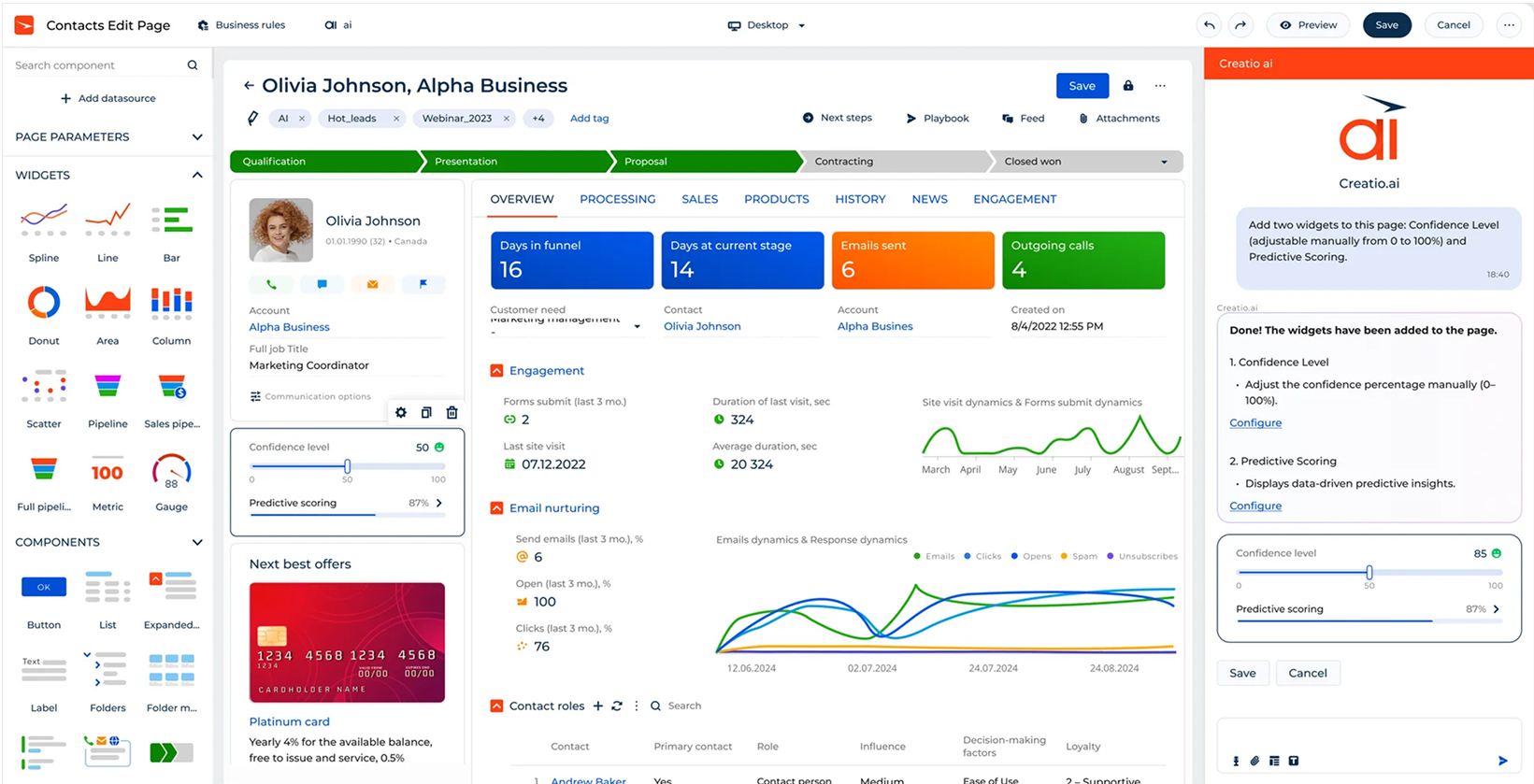
With Creatio’s CRM system, sales teams can track leads and opportunities, forecast revenue, and collaborate more effectively to close deals faster and shorten sales pipeline. Marketing teams can design and execute personalized multichannel campaigns, segment audiences, and analyze performance in real time. Customer service teams benefit from a centralized, AI-powered workspace that allows for resolving cases faster and consistently across all communication channels.
A key differentiator is Creatio’s exceptional no-code capabilities and composable architecture, which empower business users, alongside the IT teams, to adapt workflows, build applications, and automate CRM processes for virtually any industry or use case. Unlike Salesforce, Creatio doesn’t require specialized developer skills, enabling organizations to reduce costs, accelerate innovation, and avoid risks tied to IT talent shortages.
Creatio’s portfolio includes Creatio Studio, a no-code agentic platform to build applications and AI agents with natural language and visual designers, and three feature-rich CRM solutions:
- Creatio Sales – an end-to-end agentic platform to automate sales processes of any type and scale through no-code, AI and a maximum degree of freedom.
- Creatio Marketing – a ready-to-use agentic platform to accelerate lead-to-revenue cycle and variety of marketing workflows with no code and AI at its core.
- Creatio Service – an omnichannel service platform to delight customers and drive service excellence with no-code flexibility, and integrated AI capabilities.
In it Creatio 8.3 “Twin” Release, the company introduced role-specific agents for sales, marketing and service workflows. These CRM AI agents collaborate with employees by automating repetitive tasks, scaling operations, and allowing teams to focus more on customer relationships and creative problem-solving.
Creatio’s excellence has been recognized by analysts and customers alike. Creatio platform was recently recognized as a Visionary in Gartner® Magic Quadrant™ for Sales Force Automation Platforms, validating its position as an AI-native alternative to legacy CRMs. Clients also highlight its tangible business impact. For example, Dan Rafferty, Chief Technology Officer at Purplebricks has recently shared his company’s experience with Creatio: “We’ve seen a 35% increase in leads and we’re converting 50% more. And to get there so quickly? We couldn’t have done this with any other software solution I’ve come across.”
Overall, Creatio is an ideal choice for medium to large enterprises that want a flexible, efficient, and cost-effective CRM. Its combination of analyst recognition, client success stories, and cutting-edge AI capabilities makes it one of the strongest contenders for businesses seeking to replace Salesforce.
Creatio key features:
- Agentic CRM and workflow automation solutions for Service, Sales and Marketing to streamline customer-facing and internal operations
- Prebuilt CRM AI Agents to automate repetitive tasks, scale operations efficiently and accelerate time-to-value.
- No-Code AI Agent Builder to design and deploy specific AI agents that match your unique business processes and needs
- Exceptional customization and flexibility to align the platform to the specific use cases and unique business needs
- Innovative composable no-code architecture to support scalability and facilitate process automation
- Transparent, straightforward pricing model with no hidden costs
- Tailored out-of-the-box solutions for 20+ industries
- Over 400 applications and third-party add-ons available at Creatio Marketplace
Creatio limitations:
- Creatio may present a learning curve for people unfamiliar with no-code development
Creatio pricing options:
Creatio offers a unique composable pricing model where you choose and pay only for the products you want to use. The core platform offers three plans: Growth for $25, Enterprise for $55, and Unlimited for $85 per user monthly. Its CRM products, Sales, Marketing, and Service, are priced at $15 per user per month and can be purchased as a single CRM bundle or as standalone solutions to fit your company’s exact needs..
A free trial or product demo can be requested to understand the platform’s essential capabilities.
2. Zoho CRM
Zoho CRM offers a compelling alternative to Salesforce CRM with its unified, cloud-based platform for managing sales, marketing, and support functions.
Its extensive capabilities, including salesforce automation, robust analytics, AI-driven insights, and intuitive customization, cater to businesses of all sizes. Zoho CRM's flexibility in plan upgrades and add-ons ensures scalability as your business grows. Small and midsize enterprises, in particular, will appreciate the cost-effective pricing options. Zoho even offers a free version for up to three users.
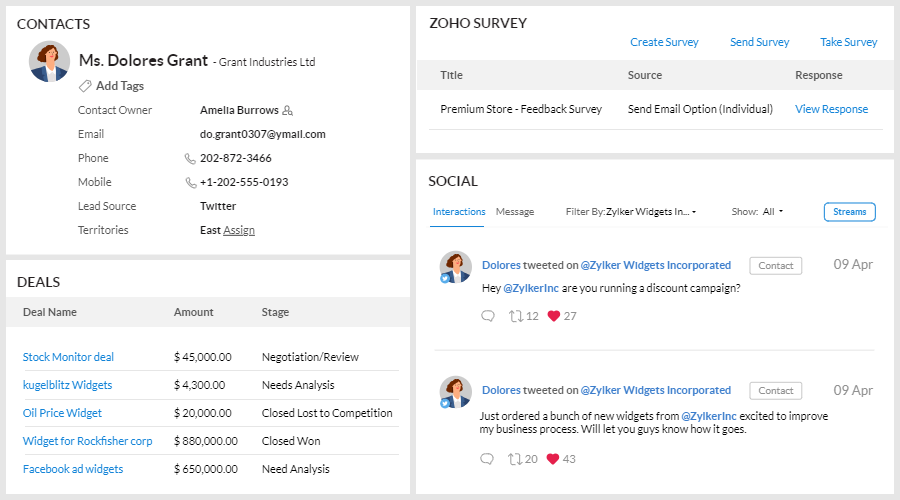
With its breadth of features and affordability, Zoho CRM is an ideal choice for those seeking a powerful, budget-friendly CRM solution.
Zoho CRM key features:
- 360 customer view for a unified sales, marketing, and support data
- Built-in AI tools (Zia AI) for lead scoring, forecasting, sentiment analysis, and workflow suggestions.
- A wide library of integrations and extensions, enabling businesses to expand functionality quickly.
- Low-code customization to help users adapt dashboards, reports, and workflows
Zoho CRM limitations:
- Reporting and predictive features lack depths
- May require more training for users to maximize its capabilities
Zoho CRM pricing options:
Zoho CRM offers four plans: a Standard plan for $20, a Professional for $35, and Enterprise for $50, and an Ultimate for $65 per user monthly. Notably, AI predicting and analytics are only available in the Enterprise and Ultimate plans. A free trial is available.
See also: Top 10 Zoho CRM Alternatives and Competitors
3. HubSpot
HubSpot CRM is an attractive alternative to Salesforce CRM, especially for small to mid-sized businesses seeking an all-in-one CRM solution.
HubSpot offers a suite of cloud-based tools that facilitate lead capture, customer interaction management, process automation, and deal closure. Notably, the introduction of Operations Hub enhances the CRM platform by automating processes, unifying data, and streamlining customer interactions.
HubSpot’s strengths lie in digital sales capabilities, support for various channels, predictive lead scoring, ease of deployment, and a free CRM option with no contact or user limits.

With prices starting at $30, HubSpot CRM is an ideal choice for smaller teams looking to streamline marketing and sales processes.
Hubspot key features:
- Unified CRM platform for marketing, sales, customer service, content management, and business operations.
- Intuitive interface with built-in collaboration features to streamline teamwork.
- Content Hub and Operations Hub designed to strengthen marketing campaigns and workflow automation.
- Advanced analytics and reporting to monitor performance and understand customer behavior.
- Free plan available to test basic CRM features before upgrading.
Hubspot limitations:
- Limited customization options for CRM workflows
- Fewer integrations compared to other providers
Hubspot pricing options:
Hubspot’s pricing model differs from other vendors since it doesn’t consider the number of users in its pricing. The two monthly plans Hubspot offers are Professional for $1180 and Enterprise for $3910. There’s also a free tool with limited capabilities available for individuals.
See also: Top 10 HubSpot Alternatives & Competitors
4. Freshworks
Freshworks CRM presents an enticing alternative to Salesforce CRM, especially for fast-growing businesses with expanding sales and marketing automation needs.
Freshworks' cloud-based suite of business tools seamlessly integrates Freshmarketer, Freshsales, Freshdesk, and Freshchat, providing modern, user-friendly experiences for managing customer data and coordinating teams. Its strengths lie in digital sales and service capabilities, supporting contemporary messaging channels, and automating actions and engagement sequences.
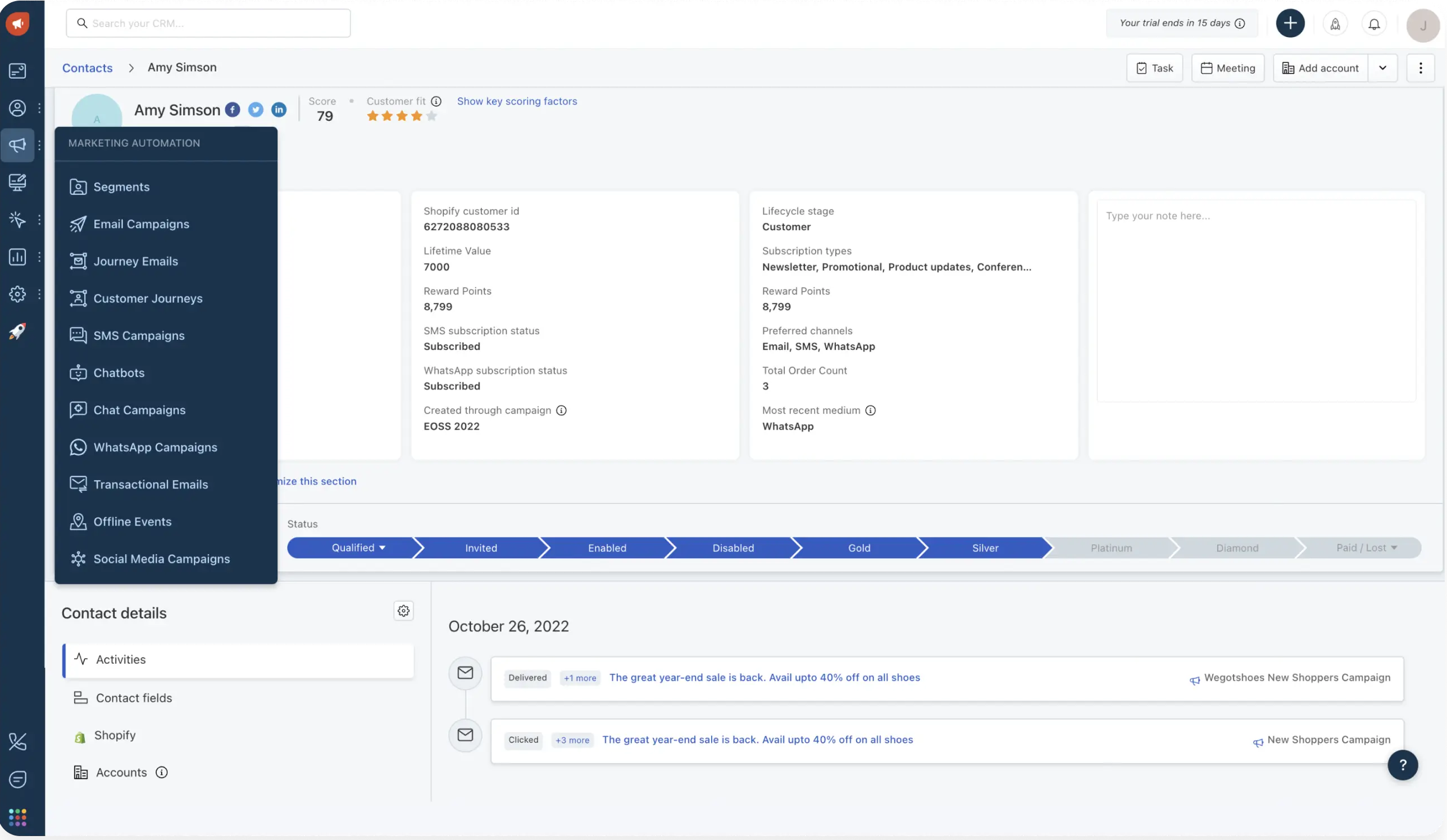
With pricing starting at $15 and free versions available for each product, Freshworks is an ideal choice for small teams seeking an easy-to-deploy and user-friendly CRM solution that aligns with their straightforward requirements.
Freshworks key features:
- A unified interface for sales and marketing workflows.
- Clear pipeline visualizations and dynamic revenue forecasting tools powered by Freddy AI.
- AI-powered sales assistance that assists in leads evaluation, email drafting, and next best actions recommendations.
- Multichannel engagement capabilities including email, SMS, WhatsApp, chat, and built-in telephony, all accessible from within the CRM.
- Variety of built-in automation capabilities for sales processes.
- User-friendly clean layout
Freshworks limitations:
- Not suited to robust enterprise scenarios and complex customization requirements
- Inconveniently bundled products: Freshservice needs to be purchased separately
Freshworks pricing options:
Freshworks CRM offers three plans: Growth for $9, Pro for $39, and Enterprise for $59 per user/month. This CRM includes marketing and sales automation. The other customer service software product can only be purchased separately; its Growth plan is $29, the Pro plan is $69, and the Enterprise plan is $109. It also offers a free trial.
5. Microsoft Dynamics 365
Microsoft Dynamics 365 is a robust contender to Salesforce CRM, providing a comparable platform with numerous benefits. Its suite includes Dynamics 365 Marketing, Sales, Customer Service, Commerce, and Customer Insights, each equipped with top-notch AI (Artificial Intelligence), business intelligence, and low-code features.
The strengths of Microsoft Dynamics 365 lie in its product breadth, seamless integration with Microsoft products, on-premises solutions, and a robust ecosystem of marketplace applications. However, some users find licensing inflexibility and product complexity challenging.
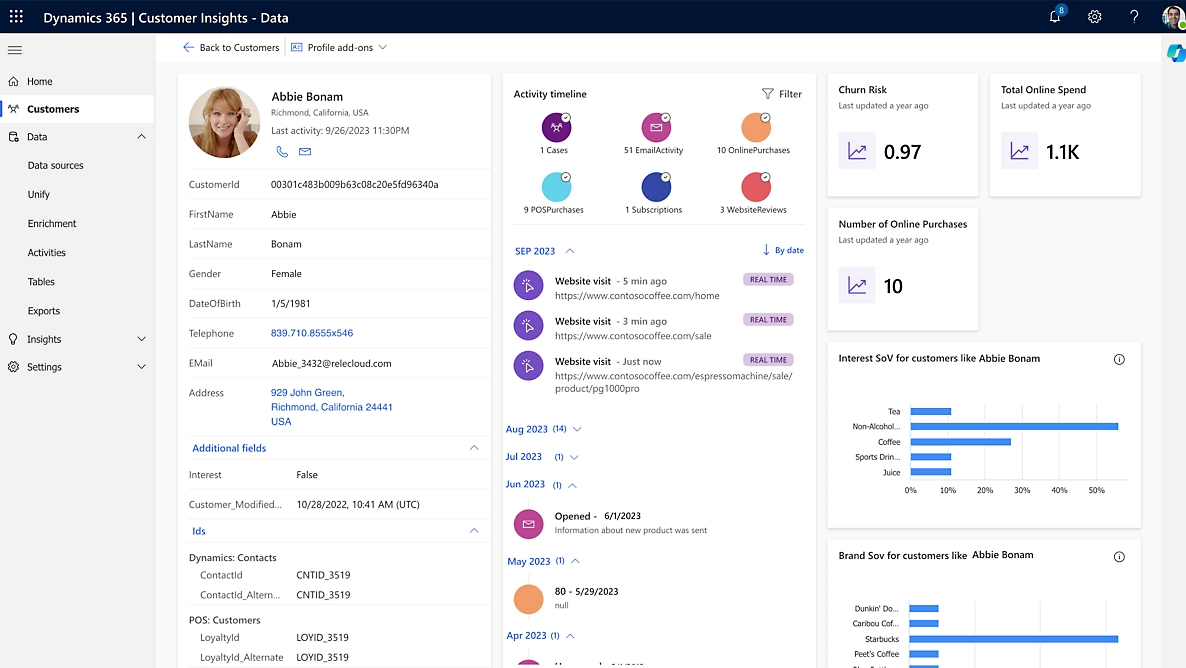
While Microsoft's licensing costs are higher than some competitors, they remain more cost-effective than Salesforce, making it an ideal choice for midsize and larger enterprises, especially those already utilizing Microsoft products or requiring a mature, on-premises solution.
Microsoft Dynamics 365 key features:
- Full suite of products for marketing, sales, customer service, commerce, and customer insights
- Unified customer view with real-time data and insights
- Robust sales pipeline and forecasting tools
- Low-code customization features
- AI Copilot integration to maximize workflows’ automation and productivity
Microsoft Dynamics 365 limitations:
- Inflexible licensing and product complexity may be challenging to some users
- CRM tools are unbundled, resulting in higher total cost of ownership
- Limited integration capabilities with non-Microsoft products
Microsoft Dynamics 365 pricing options:
MS Dynamics pricing is separated into various products they offer, all ranging from $50 per user/month to $180 per user/month.
6. Vtiger CRM
Vtiger is a great alternative to Salesforce for small businesses seeking an affordable and easy-to-use platform. It caters to both B2B and B2C markets, and various industries, including construction, financial services, insurance, pharmaceuticals, and real estate.
Vtiger offers several powerful features such as Configure, Price, Quote (CPQ), opportunity revenue schedules, and a sales learning management system. Customizable automation is enabled by Insights Designer and Process Designer. It integrates GenAI technology with its own Calculus AI add-on, enabling functions like email subject generation, email drafting, and querying.
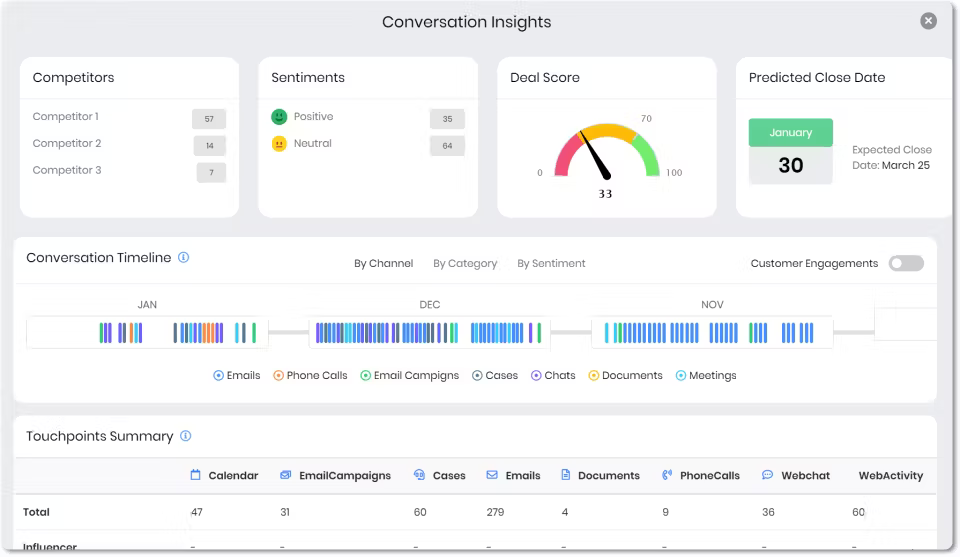
Vtiger offers helpful features for the SMB segment, such as activity and opportunity management, making it a great choice for businesses looking for a powerful and affordable solution.
Vtiger CRM key features:
- Robust sales, marketing, customer support, and productivity tools
- AI-driven insights with predictive forecasting and deal guidance powered by Calculus AI
- An extensive API and marketplace ecosystem
- Low-code customization that unlocks workflow automation and platform adaptability
- Transparent pricing tiers tailored to business size and needs
Vtiger CRM limitations:
- Underperforming sales forecasting and predictive analytics
- Poor operational performance, especially with large datasets or complex operations
- Requires third-party developers for extensive customization
Vtiger CRM pricing options:
Vtiger offers three plans: Growth for $15 per user/month, Professional for $42 per user/month, and Enterprise for $58 per user/month.
7. Oracle CX Cloud
Oracle CX offers a compelling substitute to Salesforce CRM, establishing itself as an industry titan with impressive product maturity.
Oracle CX, part of Oracle's extensive cloud product range, provides a complete suite of customer experience solutions to improve multi-touchpoint engagements. Its strengths lie in the depth of its products, robust analytics capabilities, and enterprise-level scalability, although some users find it heavy on customization.
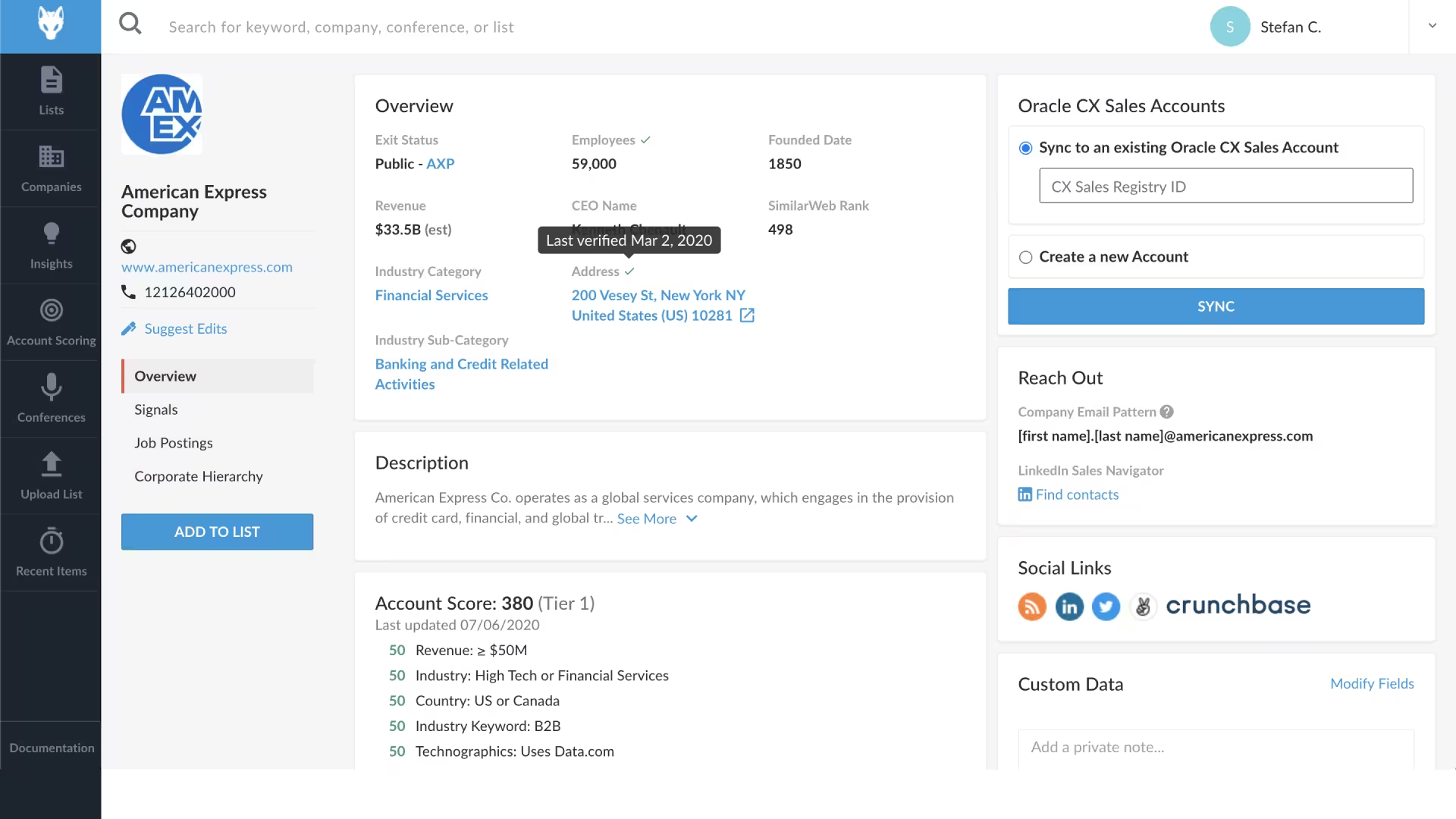
While it is more expensive than some competitors, Oracle CX is a feature-rich CRM solution suitable for businesses of all sizes. It is an excellent choice for midmarket to enterprise customers seeking to boost their multichannel sales and marketing efforts or service workflows.
Oracle CX key features:
- Modular, industry-specific deployments with deep ERP integration support
- Built-in configure-price-quote, analytics, automation, and CX modules across verticals
- Omnichannel support backed by AI and knowledge management
- Enterprise-level scalability, secure integrations, and a data-first customer experience
- AI-powered tools for predictive scoring, tailored recommendations, email and content generation, and more Enterprise-level scalability and customization
Oracle CX limitations:
- Outdated user interface
- Slow loading times and delayed system responses
- Limitations on the number of records that can be targeted in custom objects
Oracle CX pricing options:
Oracle CX Cloud offers four different plans: Professional for $65 per user/month, Standard for $100 per user/month, Enterprise for $200 per user/month, and Premium for $300 per user/month.
8. SAP
SAP CRM's extensive range of reliable, enterprise-grade apps makes it a strong competitor to Salesforce CRM.
A notable feature is its built-in integration with SAP ERP (Enterprise Resource Planning), facilitating a comprehensive, centralized perspective of customer and financial data. With robust sales operations functions encompassing sales pipeline management, forecasting, quoting, and order capture, it caters to large and mid-sized enterprises.
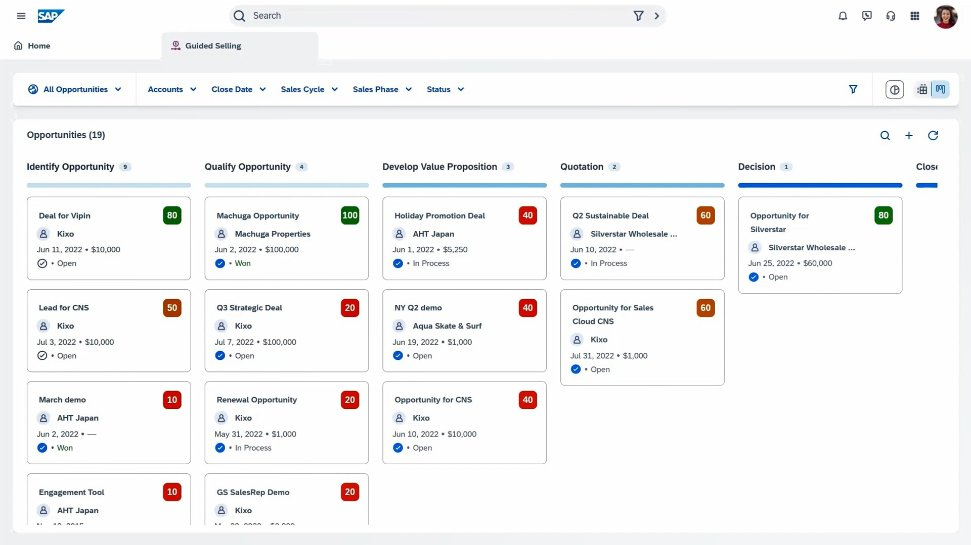
Despite its potential shortcomings in terms of modern channel support and AI capabilities, SAP CRM can be an appealing choice for businesses looking for integrated and scalable CRM software.
SAP CRM key features:
- Built-in integration with SAP ERP
- A comprehensive suite of CRM functions for sales, marketing, service, analytics, and personalization
- Interactive dashboards and on-demand reporting to power data-driven decisions and personalized engagement
- AI-assisted report builders, customer sentiment analysis, and intelligent service workflows
SAP CRM limitations:
- High costs for implementation and ongoing maintenance
- Steep learning curve for users due to its extensive features and complex interface
SAP CRM pricing options:
The pricing starts at $58 and is calculated based on the number of users and your chosen solutions. To get the exact price, you’ll have to contact SAP’s sales representative.
9. Pegasystems
Pegasystems CRM stands as a robust substitute for Salesforce CRM, especially for large enterprises managing high-complexity processes.
Pegasystems' strength lies in its real-time decisioning engine, powering a suite of process-centric applications spanning marketing, sales, and customer service tools. While acknowledged for configurability and robust process automation capabilities, the learning curve may be steep.
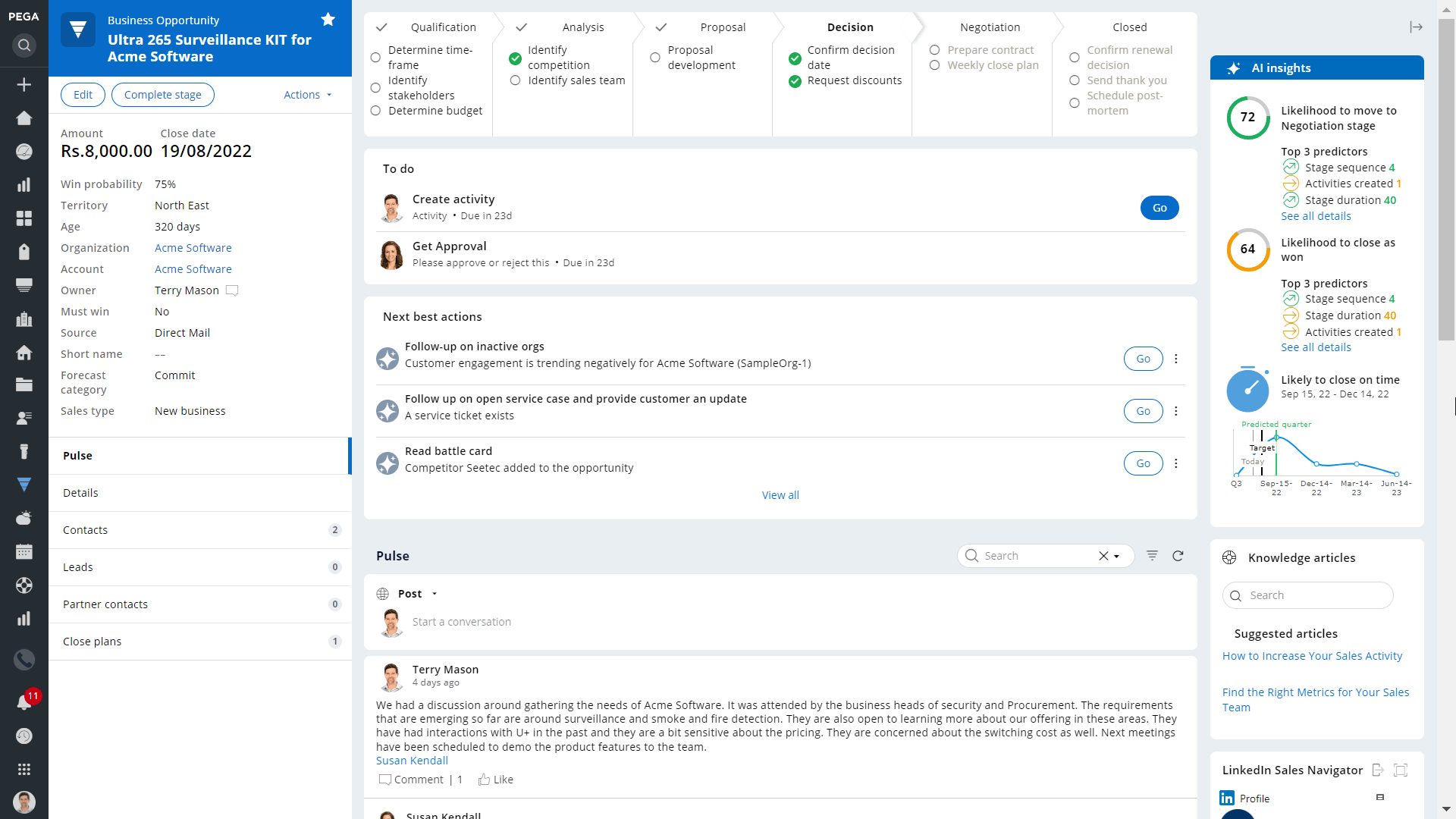
It is a worthy investment for companies requiring a sophisticated, adaptable CRM tool tailored to dynamic industries like healthcare, insurance, and financial services.
Pega CRM key features:
- Seamlessly integrates sales, marketing, and service with real-time automation and AI decisioning
- Customer-centric “centered” architecture, offering next-best-action recommendations for smarter engagement
- Orchestrates complete customer journeys with dynamic case management, predictive analytics, and end-to-end workflow automation
- Adaptable solutions for selected industries are available
Pega CRM limitations:
- The learning curve may be steep due to extensive and complex configurability
- Integrating Pega can require in-depth knowledge of its proprietary rules and architecture
- User interface is often described as cluttered and overwhelming
Pega CRM pricing options:
Pega CRM has four pricing editions, from $97 to $260.
10. Zendesk Suite
Zendesk Sell CRM serves as a compelling alternative to Salesforce CRM, particularly for organizations seeking streamlined customer service and full sales process automation.
It excels in digital engagement, offering versatile channel support, including modern messaging and rule-driven chatbots, which benefits companies with high lead and inquiry volumes. Zendesk's CRM is user-friendly and straightforward, making it accessible to a wide range of users.
A stand-out feature is undoubtedly Zendesk’s customer service suite, which is fully integrated with Zendesk Sell CRM. While it excels in many areas, it could improve real-time intelligence and process management.
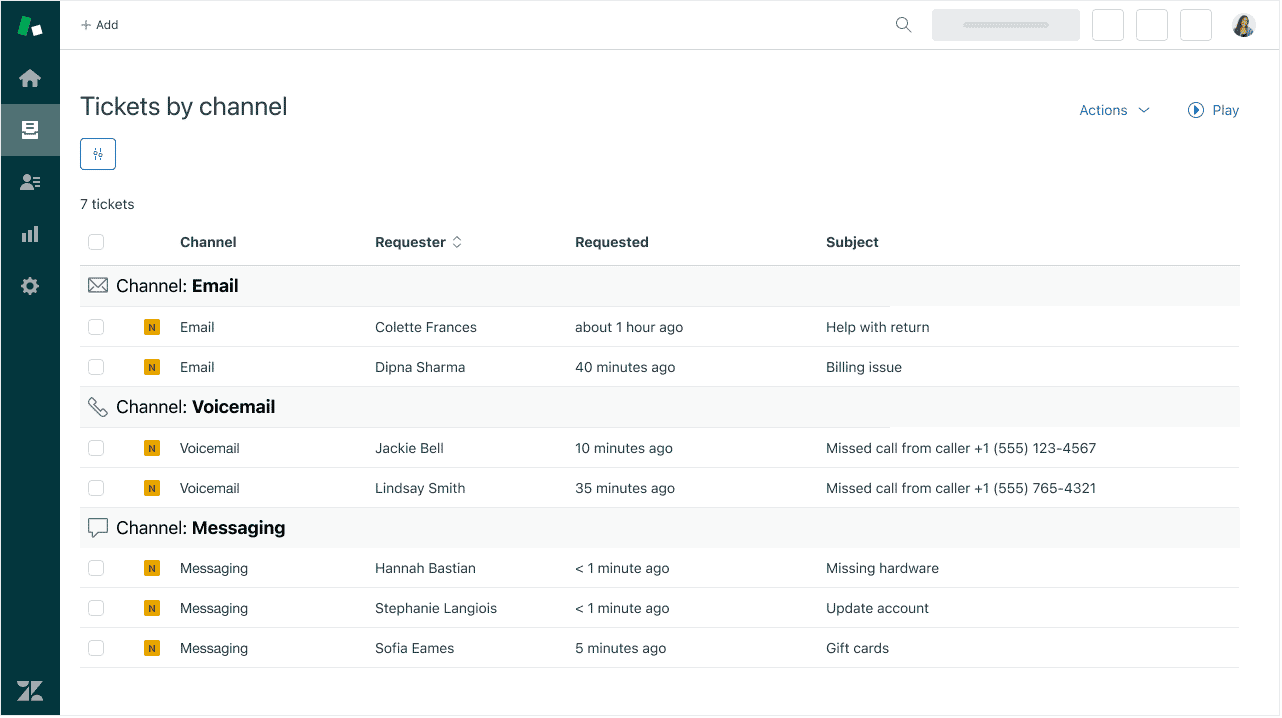
Overall, it is an attractive choice for midsize and larger companies with substantial interaction volumes and a strong digital presence.
Zendesk Suite key features:
- A unified, omnichannel helpdesk that aggregates all customer touchpoints, including email, chat, social media, and voice
- Centralized agent workspace for faster ticket resolution and richer customer context
- Built-in knowledge base and self-service options
- AI-driven automation and AI agents that handle routine inquiries and workflows
- User-friendly UI
Zendesk Suite limitations:
- Weak real-time intelligence and process management
- Specific or complex customization may require developers’ skills
- Frustrating customer support
Zendesk Suite pricing options:
Zendesk offers three pricing editions, from $69 to $149 per user/month.
11. Insightly
Insightly CRM is an attractive alternative to Salesforce CRM, particularly for small and medium-sized enterprises seeking a cost-effective and robust sales CRM.
Insightly's cloud-based platform combines contact and lead management, project management, and comprehensive features to automate repetitive tasks in one user-friendly offering. It elevates sales and marketing initiatives, consolidates customer data, and streamlines work management, making it an ideal choice for organizations seeking to enhance operational efficiency. Notable strengths include its ease of use, reporting and analytics capabilities, and integration features.
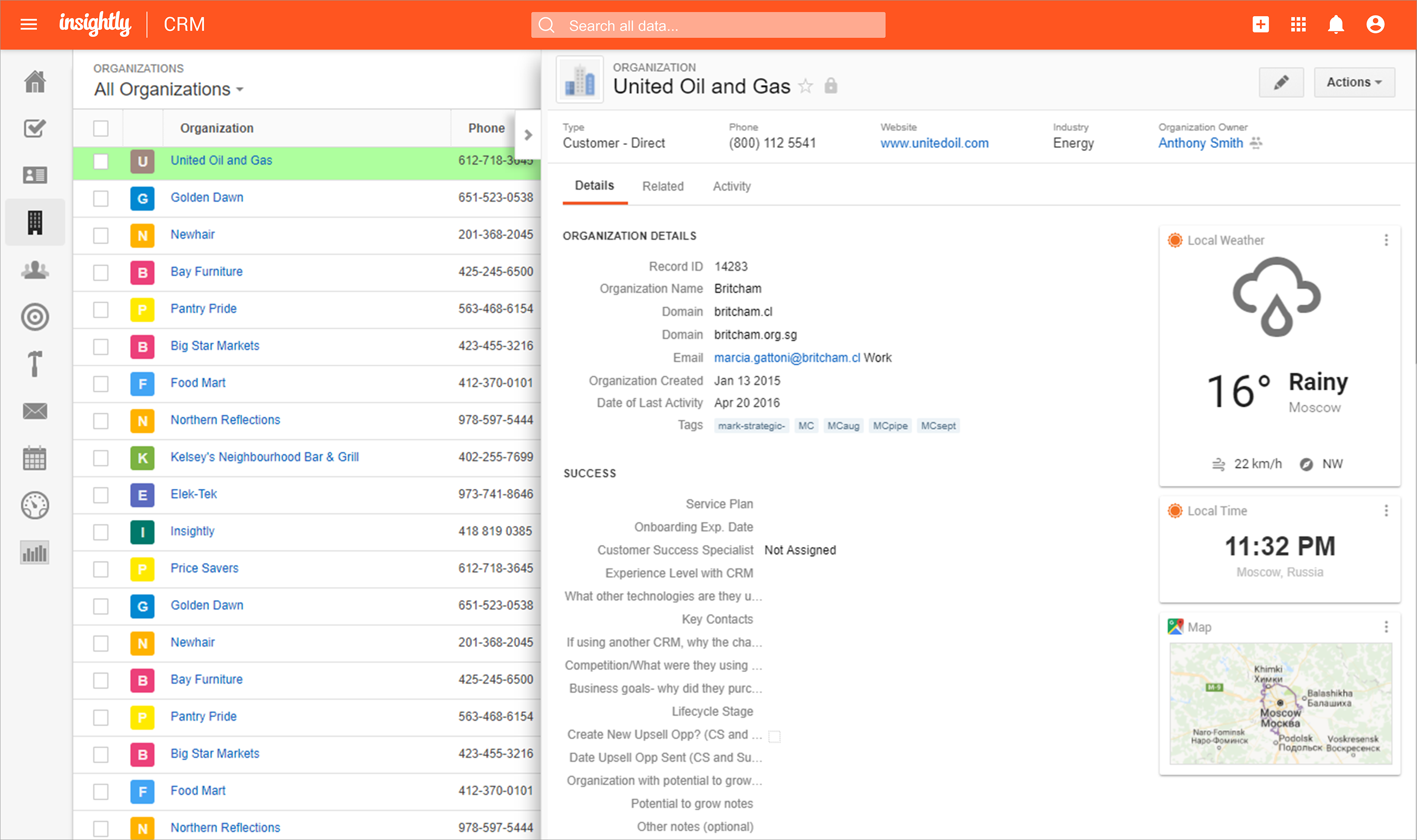
With its affordable pricing plans, it is a cost-effective option for businesses seeking to optimize their CRM processes without breaking the bank.
Insightly key features:
- Detailed insights into customer segments as well as individual leads and contacts.
- Advanced analytics and reporting features to track sales performance and outcomes.
- High level of customization to align with unique business processes and requirements.
- Built-in task management tools with the ability to add notes and comments across records.
- Streamlined data import for easier migration and complete customer profiles.
- Strong contact management functionality supported by granular segmentation.
Insightly limitations:
- Limited integrations that are difficult to set up
- AI functionality is limited to only crafting email summaries and response suggestions
Insightly pricing options:
Insightly CRM offers three plans: Plus ($29 per user/month), Professional ($49 per user/month), and Enterprise ($99 per user/month). A free trial is available.
12. Monday.com
Monday.com offers a flexible and versatile alternative to Salesforce CRM. While it is not a dedicated CRM, its cloud-based work management platform allows users to customize boards and workflows for customer-related activities.
It excels in adaptability, accommodating various workflows, including CRM, project management, and software development. Additionally, Monday.com provides a dedicated, ready-made sales platform.
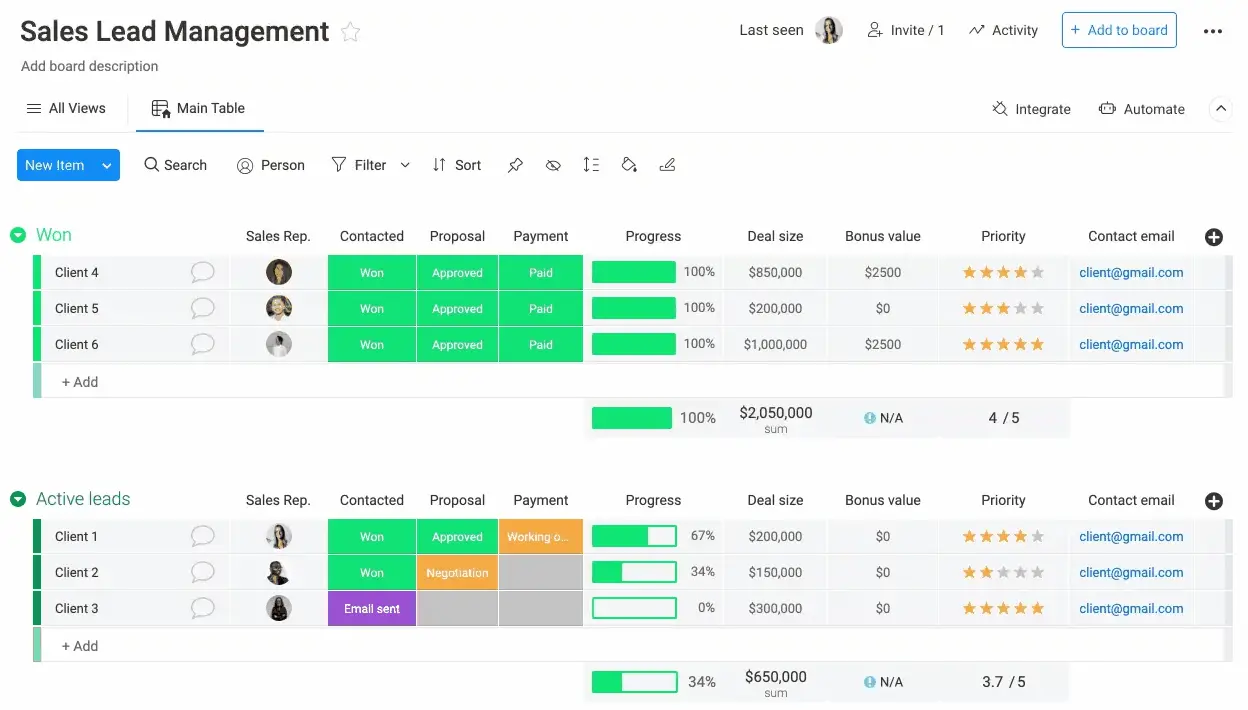
Monday Sales and CRM software is an ideal choice for small and mid-sized businesses and those who prefer Kanban boards for organizing information. Monday’s adaptability and affordability make it a compelling alternative to traditional CRM solutions.
Monday.com key features:
- A unified, visual CRM platform that manages leads, deals, post-sales workflows, and entire customer journeys.
- Ready-made templates for CRM setup (leads, contacts, deals, activities).
- Customizable deal pipelines with drag-and-drop columns, views, and automations.
- Integrations with major tools like Gmail, Outlook, Slack, Zapier.
- Adaptability and versatility in terms of board and workflow customization.
Monday.com limitations:
- Core CRM tools are limited in lower-tier plans.
- Most of its email management capabilities are not included in the Basic and Standard plans.
- Advanced sales tools are available only in the Enterprise plan.
- Lacks sales automation tools.
Monday.com pricing options:
Monday CRM offers three plans: Basic ($15 per user/month), Standard ($20 per user/month), and Pro ($33 per user/month). A free version of the tool is available.
Why Customers Switch to Creatio from Salesforce: Nucleus Research Findings
Nucleus Research conducted an in-depth study of organizations that migrated from Salesforce and Microsoft to Creatio. The findings reveal that these businesses achieved significant improvements in efficiency, agility, and overall value. Customers consistently pointed to three primary factors driving the switch: reduced total cost of ownership (TCO), faster time-to-value (TTV), and strong integration capabilities.
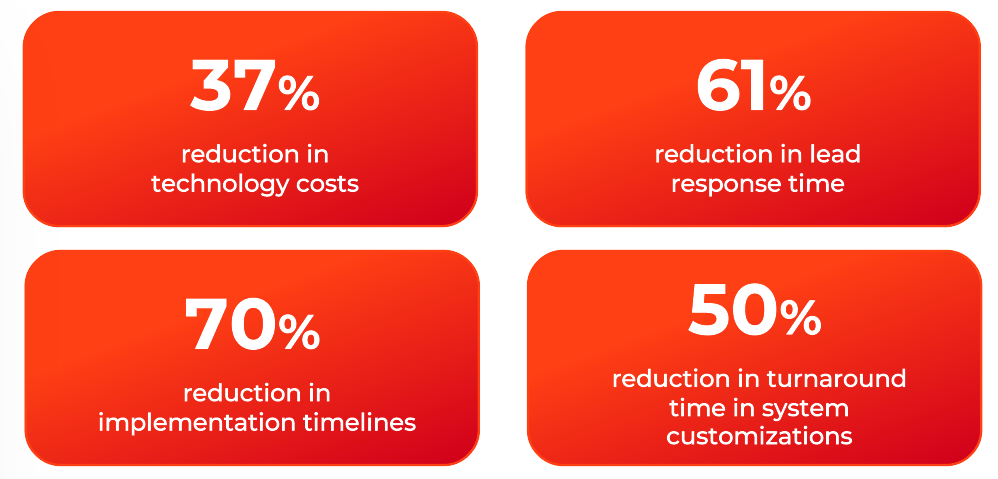
*Measured from customers switching from Salesforce to Creatio
Reduced Total Cost of Ownership (TCO)
Creatio helps businesses cut overall CRM costs by reducing reliance on the IT teams and accelerating platform’s implementation and customization process. Thanks to its no-code tools and composable architecture, customers switching from popular CRM solutions like Salesforce and Microsoft report a 37% lower in total cost of ownership. For example, Creatio customer who switched from Salesforce has noted:
“Our Creatio implementation was drastically different from our experience with Salesforce... We customized the platform in a fraction of the time, and making adjustments as our needs evolve has been dramatically easier.”
Faster Time-to-Value (TTV)
With Creatio, businesses can build their unique applications for CRM and workflows, realizing ROI in under just 12 months. Deployments are completed in weeks — often 70% quicker than other CRM providers — allowing teams to adopt new workflows with ease and stay aligned with the changing market trends.
Strong Integration Capabilities
Creatio CRM easily connects with the rest of your tech stack through the 700+ apps and ready-to-use templates available on the Creatio Marketplace. By integrating sales, marketing, and service tools into a single platform, businesses gain a unified view of customer data without costly custom development. This results in streamlined lead-to-revenue workflows, reduced manual data entry, and even an 11% average boost in conversions.
Summary
Switching from Salesforce has become a popular question for businesses struggling with high costs, complex customization, and usability challenges. To find the best alternative, decision-makers should focus on core CRM features, scalability, integration capabilities, and overall value. The top Salesforce alternatives for 2026 include Creatio, Zoho, HubSpot, Freshworks, Microsoft Dynamics, Zendesk, and others..
Among these contenders, Creatio stands out as a leading Salesforce alternative for its advanced CRM and workflow automation, agentic capabilities, composable no-code architecture, and flexible pricing. According to Nucleus Research, companies that switch to Creatio see up to a 37% reduction in technology costs, a 70% faster implementation, along with major efficiency and agility gains. Backed by analyst recognition and customer success stories, Creatio helps align your CRM needs with your business objectives, guaranteeing a smooth transition and long-term business growth.




















































